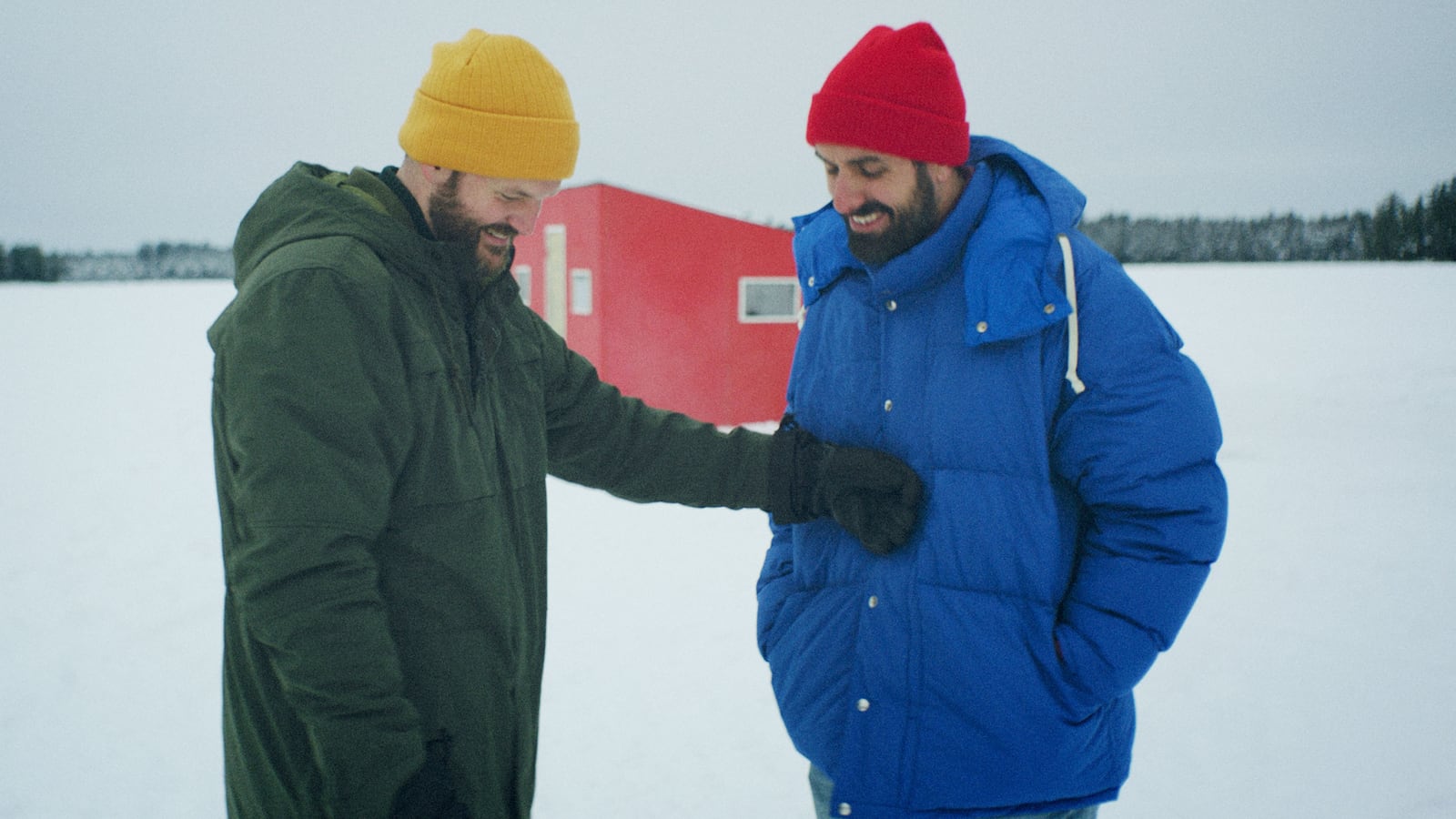Humor bonded multi-hyphenate filmmakers Michael Angelo Covino and Kyle Marvin over a decade ago. Back then, Marvin was producing commercials in New York City, while Covino already had a reputation in the independent film scene. Asked to find someone willing to approach random pedestrians on the street to participate in an ad, Marvin hired Covino based on a colleague’s recommendation—a life-changing event for both of them.
A kindred taste in offbeat comedy led to a fast friendship, with the duo first laughing at the same bizarre videos then spending all their free time making their own. The talented best buds went on to produce indie projects such as Babysitter, Kicks, and Hunter Gatherer, before pursuing their own story.
“Kyle’s just a really nice guy. He’s a very welcoming person, so I was drawn to that,” Covino says. For Marvin, it was Covino’s knack for injecting amusing chaos into the workplace that prompted his interest in befriending him. “Mike’s very technically gifted, but he also used to do insane things like buying the entire crew matching outfits and making us all wear them. That added an extra pleasure to working with him,” recalls Marvin. Their affectionate banter comes through even by phone, as they speak fondly of one another and what they’ve shared making movies as a team for so long.
Last year, the two premiered their most personal joint venture yet, this time in key artistic roles. Covino and Marvin co-wrote and co-star in The Climb, their critically acclaimed debut feature, which Covino also directed. After screening in Cannes, Toronto, Telluride, and Sundance, the idiosyncratic bromantic comedy is now playing in the U.S. (wherever movie theaters are open) after being postponed on several occasions due to COVID-19.
Channeling Marvin’s natural warmth and Covino’s comically frantic energy without precisely being about them, The Climb details a turbulent life-long friendship between two straight men on shaky ground after one of them reveals a major betrayal. “Initially, it was an idea I had while I was on a long bike ride contemplating a friend of mine who had slept with one of my ex-girlfriends,” explains Covino. “Not me!” chimes in Marvin, a reminder that this isn’t an entirely biographical piece.
The concept began as a 2018 short film of the same name, encompassing what is now the opening segment of the longer version: the scene in which the fictional Mike and Kyle are biking as the former drops the inconvenient truth. “I couldn’t help to think, ‘There’s got to be comedy in there somewhere,’” says Covino. With this setup, he sought to explore how they would process Mike’s admission of guilt in the midst of demanding physical activity, and the outcome of that exchange: Is the end of their fellowship inevitable or can forgiveness shine through?

Once they completed the short, the duo felt it would be fun to explore things further. Divided into chapters, beautifully choreographed long-take vignettes, the feature iteration of The Climb maps out their platonic love—with its ups and even more downs—spanning several years and touching on multiple milestones (a funeral, a marriage, the hazards of raising a child).
Mike and Kyle, the characters, have a complicated and convincingly lived-in dynamic on screen, thanks to Covino and Marvin’s inherent brotherly chemistry. Lacking self-confidence, Kyle seems to let others—namely his fiancée, Marissa (Gayle Rankin)—dictate his every move. Irremediably kind, he always looks out for others first. Conversely, Mike, mourning an enormous loss, operates from deep-rooted selfishness and self-pity. At the intersection of their polarized personalities, and despite the quarrels that arise, lies the screenplay’s guiding principle: their bond can withstand virtually anything.
“When we set out to write this we really had an understanding that no matter what happens, this friendship’s not going to get broken up,” notes Covino. “It became really fun to push the envelope of how hard we can test that relationship and how horrible one character could be to the other, not for the sake of being horrible, but just being self-interested and focused on their own needs and their own wants.”
Through it all, both Mike and Kyle project an openhearted masculinity that differs from the rigid or superficial interactions between men that abound in media. Sincere vulnerability permeates each episode, not solely due to the personal plights they face, but because their comfort level with the other allows for that to transpire. “There’s a lot of behavior that exists between men, specifically heterosexual men, that is just far more nuanced, complex, and emotional than maybe we give credit sometimes,” says Covino.
Although conscious of the current conversation on toxic masculinity, Covino and Marvin didn’t set out to make a statement on the fractured state of American manhood via their work. Avid storytellers, they simply wrote based on their experience and how they’ve approached closeness with other men. The result is an alternative, more profound take on companionship.
“We’ve seen a lot of portrayals of male characters who keep everything bottled up or have to make sure that they look masculine or tough and like they can handle anything. They don’t show their emotions. But that wasn’t these characters. These are guys who wear their emotions on their sleeves and talk about their feelings with each other, and who are probably more in line with the type of male friendships that Kyle and I are both used to having, which are just open and honest,” offers Covino.
So even though Mike has done something truly awful (having an affair with his best mate’s wife-to-be), he fesses up to his wrongdoing, and the two work through their mess of emotions.
Some critics have referred to the bromance in The Climb as “toxic,” a connotation Covino and Marvin dispute, as it simplifies the subtleties of Mike and Kyle’s many-sided brotherhood. “Both of these characters get a lot from the other person. The challenge of the relationship that we were trying to explore is that it’s not just toxic. It’s not just black and white,” notes Covino. According to him, it doesn’t boil down to Kyle being incapable of standing up for himself or of finding the courage to exorcise Mike from his life.
“There’s a lot more there than just either toxicity or them being bad for each other. Everything is good or bad for you in some varying degree. We really liked the idea of exploring that gray area: it’s kind of bad for you, but it’s kind of good for you. But they love each other, so how do you quantify that?” asks Marvin.
Covino and Marvin remember the peculiar, short-lived era, from the mid-aughts to the early 2010s, when movies about male friendship were at the forefront of comedy. Hits like I Love You, Man, Superbad, The Hangover series, Pineapple Express, 21 Jump Street, and countless others inserted the notion of a bromance, and the necessary man-dates to nourish this nonsexual relationship, into the pop-cultural consciousness.

However, since the majority of those releases mine gentleness and genuineness for mockery, the co-scribes didn’t find themselves strongly influenced by them—even if they were, presumably, hiking similar territory. “The ones from that time period that Mike and I respond the most to are those where the actors and the script and everything else is geared toward truly feeling the emotions,” maintains Marvin.
Behind the scenes, the real BFFs enjoyed the collaborative process. Since they envisioned the film in tandem from the onset, and were also acting in it, Covino and Marvin could rehearse scenes while writing them to gauge their effectiveness, experiment with comedic timing, and finesse certain beats. While making a movie is an undeniably tense endeavor, even more when wearing multiple hats on set, the result is a testament not only to their skills, but also to their comfortable symbiosis.
“We’ve been making stuff together for so long that our camaraderie helped offset the stress, as opposed to having to do it without someone who you trust there with you,” stresses Marvin. “We’ve grown so close over the years that our friendship has gotten to that place where it feels unbreakable.”
“When you get that close with another human being and spend every day with them and you really rely on them, you trust each other so implicitly, you probably fight more with those people than you would with anyone else, but you also care more deeply about them,” adds Covino. “Overall the experience was amazing and only made us closer. I’m sure we would not be talking anymore if the film was a total failure!”
One way in which The Climb does reflect “conventional” manliness is how outdoor activities—whether biking, skiing, or ice fishing—serve as vehicles for the drama, and in turn humor, to emerge between Mike and Kyle. But even in that regard, Covino and Marvin manage to put their unique spin on it. Aside from being one of Covino’s favorite hobbies, cycling informed the way the characters dealt with the inciting incident whilst fighting exhaustion, as emotional and physical agony intertwine. Nevertheless, they persist.
As Covino puts it, “There’s a sense of hope that despite the adversities we face in life, the suffering and the hardship, there can be a level of optimism for the future and even a beauty in the messiness of the way things play out.”


